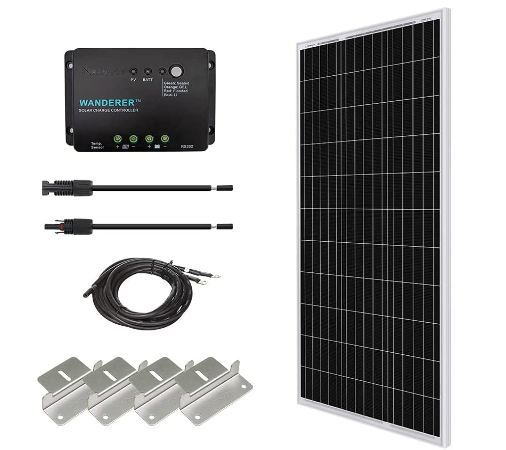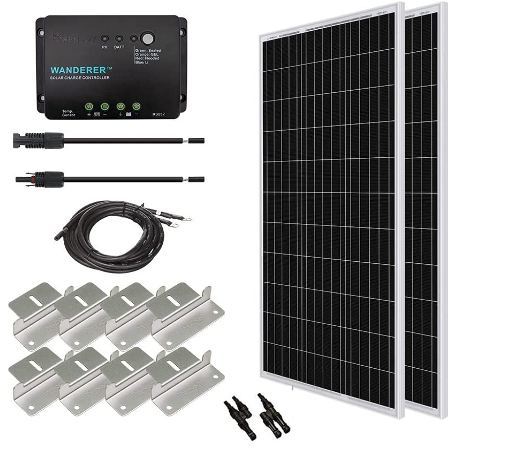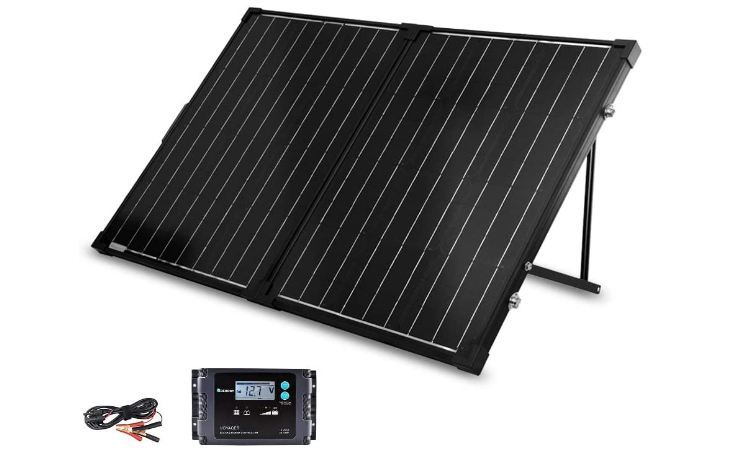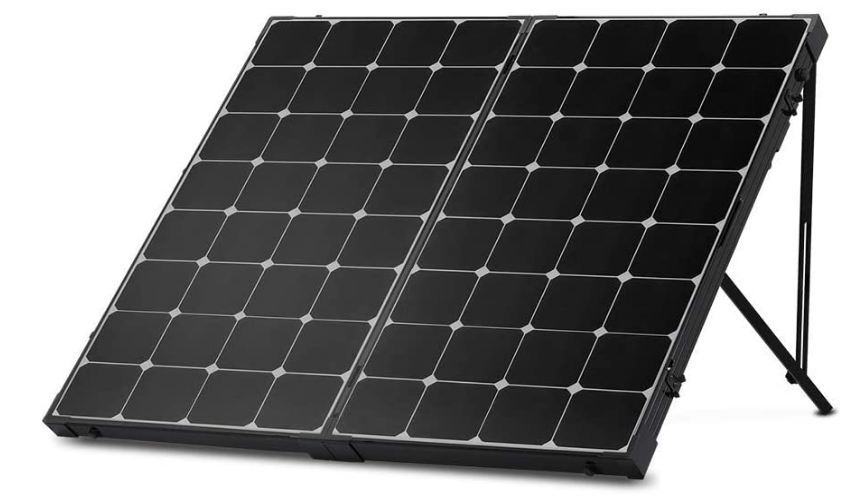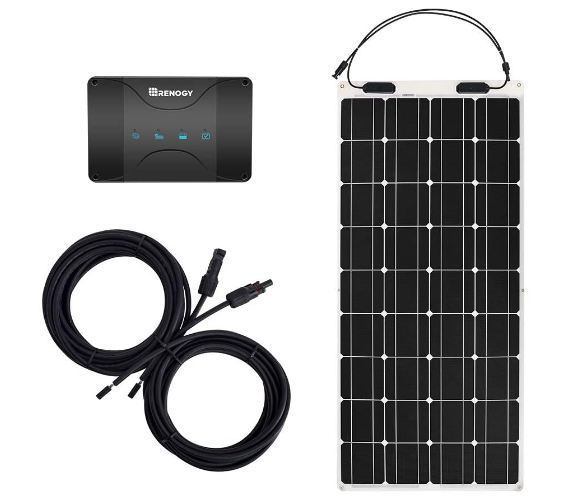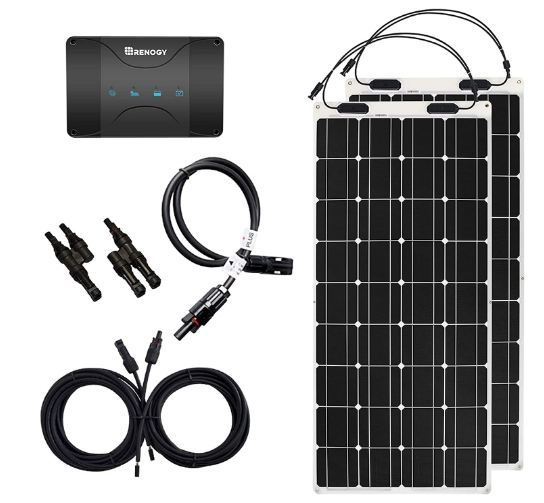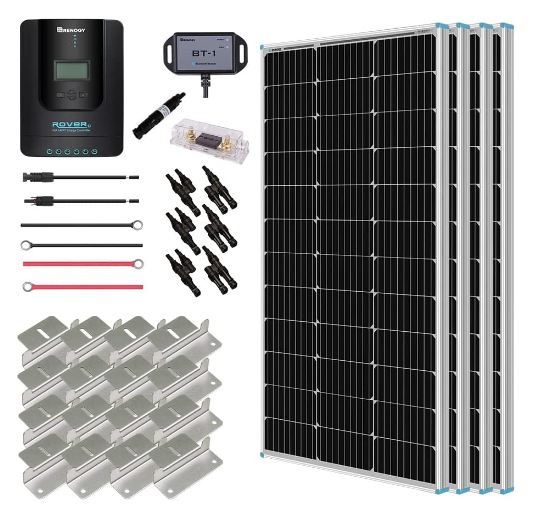Shopping for a Renogy solar panel kit?
You've come to the right place.
What's In This Guide
In this buying guide we recommend, review and compare the best Renogy solar panel kits for a variety of needs and applications.
We begin by listing our top picks for a variety of common needs and situations, followed by a quick product comparison table and in-depth reviews of our top picks.
Then, we provide a buying guide describing the key features & gotchas to look for when buying a Renogy solar panel kit - plus other tips.
Finally, we answer common questions asked about Renogy solar panel kits.
Hopefully, this guide will help you find the best Renogy solar panel kit for your specific need or application.
If you have any questions, leave us a comment below.
Prefer a solar generator to a solar panel kit? See our reviews of the best home backup solar generators, camping solar generators, and small portable solar generators.Solar generators are self-contained with the charge controller, battery, and inlet/outlet ports all integrated into a single compact unit.
Types of Renogy Solar Panel Kits
Here are the different types of solar panel kits Renogy sells.
Starter kits: These are the beginner solar panel kits for people who are starting out in solar and anyone looking for a pocket-friendly Renogy solar panel kit. These kits include monocrystalline solar panels and PWM or MPPT charge controllers.
Premium kits: These feature advanced solar panels with higher efficiency, performance and reliability, MPPT charge controllers, a bluetooth module for remote monitoring, and premium accessories to complete your solar setup.
Renogy premium kits are ideal for those looking for a serious solar panel kit for a grid-tied or off-grid solar system.
RV, van & boat kits: These highly portable kits are designed specifically for installation on an RV, van or boat. Options include briefcase style solar panels, flexible solar panel kits, and marine solar panel kits.
What Do Renogy Solar Panel Kits Typically Include?
Renogy solar panel kits usually include all of the equipment you'll need to generate DC current from the sun. Most include the following components:
Inverter and energy storage are usually not included; you have to buy them separately.
You’ll need an inverter if you are setting up a grid tied system. It converts the DC power generated by the solar panel to AC power that can be fed into the grid.
Instead of a standard central inverter, you can use newer micro inverters. These are individual mini inverters that connect to each solar panel, and improve the output and performance of the entire system.
If you are setting up a battery backup or fully off-grid system, you’ll need a battery bank.
Here, your two main options are lead-acid batteries (cheaper but heavier, not as efficient, and have reduced lifespan) and lithium ion batteries (pricier but longer lasting, lighter, and more efficient).
Best Renogy Solar Panel Kits
- 1Best Fixed 100W: Renogy 100W Starter Kit
- 2Best Fixed 200W: Renogy 200W Starter Kit
- 3Best Portable 100W: Renogy 100W Solar Panel Suitcase
- 4Best Portable 200W: Renogy 200W Solar Panel Suitcase
- 5Best Flexible 100W: Renogy 100W 12V Flex Solar Bundle
- 6Best Flexible 200W: Renogy 200W 12V Flex Solar Bundle
- 7Best RV/Van Kit: Renogy 400 Watt 12V Premium Kit
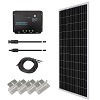
100W starter kit
Best 100W fixed
Output
100W30A PWM charge controller
Panel size
42.4 X 20.0 X 1.38 in
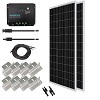
200W starter kit
Best 200W fixed
Output
200W30A PWM charge controller
Panel size
42.4 X 20.0 X 1.38 in
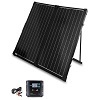
100W foldable kit
Best 100W portable
Output
100W20A PWM charge controller
Panel size
20 x 27 x 2.8 in
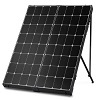
200W foldable kit
Best 200W portable
Output
200W20A PWM charge controller
Panel size
41.3 x 21.1 x 3.1 in
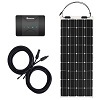
100W flex kit
Best 100W flexible
Output
100W30A MPPT charge controller
Panel size
49 x 21.3 x 0.08 in
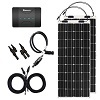
200W flex kit
Best 200W flexible
Output
200W50A MPPT charge controller
Panel size
49 x 21.3 x 0.08 in
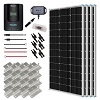
400W premium kit
Best RV/Van kit
Output
400W40A MPPT charge controller
Panel size
42.4 X 20.0 X 1.38 in
1. Best Fixed 100W: Renogy 100W Starter Kit
Why We Like It
The Renogy 100W starter kit is the best choice for anyone looking to dip their toes in solar. The entire kit is not too expensive and generates just enough power to support a small to medium size off-grid or battery backup system.
Specification |
|---|
Output: 100W |
What’s Included?
The 100W starter kit comes with a rigid 100W monocrystalline solar panel, a 30A PWM charge controller with a max input of 400W, solar cables and connectors, and mounting hardware for the solar panel.
Performance & Efficiency
The included solar panel has a 21% efficiency and works great in different light conditions.
The 100W output is not a lot, and will actually be less than that most of the time. The average daily total output is 400Wh. We recommend the Renogy 100W kit for recharging small batteries (max 100 Kwh or 83Ah).
You can expand the system by getting additional 100W panels but keep in mind that the charge controller can handle up to 400W of power input. You are limited to four solar panels.
The main weak point of the Renogy kit is the charge controller. It’s a PWM controller, which is not as efficient as an MPPT charge controller.
But unless you are planning to add more solar panels, the PWM controller is good enough for the 100W kit.
There’s an option to get the kit with an MPPT controller, but it’s pricier.
Installation
The 100W Renogy solar panel kit is designed for fixed installation on the roof.
The kit comes with all the hardware you need for mounting including Z brackets, nuts, washers, and bolts.
You also get a pair of 20ft 10 AWG solar panel cables for connecting the solar panel to the charge controller and a pair of 8ft 10 AWG tray cables for connecting the charge controller to a battery.
Pros
Cons
Bottom Line
If you currently don't need a lot of solar power, the Renogy 100W starter kit is perfect. If you need more power in the future, it’s easy to expand it.
Avoid it if you want a high output system that can support a large battery bank.
2. Best Fixed 200W: Renogy 200W Starter Kit
Why We Like It
The Renogy 200W kit puts out more power while still taking up minimal space. It’s perfect for charging small to medium size batteries, and can be used at home, in an RV, or for vanlife.
It still spots the PWM charge controller found in the 100W kit, but you can upgrade to a kit with an MPPT charge controller for a bit more money.
Specification |
|---|
Output: 200W Average daily output: 800Wh Solar panel: 2 x 100W Monocrystalline panels Panel size (per solar panel): 42.4 X 20.0 X 1.38 in, 14.3lbs Charge controller: 30A, 400W PWM Battery compatibility: Lithium, lead acid, & gel |
What’s Included?
The 200W Renogy starter kit includes two monocrystalline solar panels, each with a max output of 100W.
It also includes a PWM charge controller rated at 30A and with a max PV input capacity of 400W.
For wiring, you get 20ft solar panel cables, 8ft tray cables, and solar panel Y branch connectors.
All necessary mounting hardware is also included with the kit.
Performance & Efficiency
The Renogy 200W kit puts out double the power of the 100W kit. Assuming four hours of maximum sunshine intensity, you’ll get 800Wh of power each day from the two solar panels.
That’s enough to charge bigger battery packs up to about 200Ah in capacity.
The 200W kit is also capable enough to support a small off-grid system. If you mostly want to power small appliances, keep lights on and charge your devices, the Renogy 200W kit is up to the task.
The PWM charger is not our favorite in terms of efficiency, but it’s good enough for a 200W kit. You can still get the pricier 200W kit with an MPPT charge controller if you want to recharge your batteries in less time.
As for expandability, the charge controller limits you to a max solar input of 400W. So you can only add one more pair of 100W solar panels.
Installation
The two solar panels in the Renogy 200W kit are designed to go up on the roof. All necessary mounting hardware as well as cables are provided.
This includes the Y branch connector for linking the two solar panels in parallel.
Pros
Cons
Bottom Line
The Renogy 200W solar panel kit is a great choice for homeowners, cabin dwellers, RV owners, and van lifers looking to generate more solar power without getting a bulky solar system.
Avoid it if you need to charge a large battery bank (300Ah or more), or if you are looking for a portable kit.
3. Best Portable 100W: Renogy 100W Solar Panel Suitcase
Why We Like It
If you want solar power while outdoors, we recommend the Renogy 100W suitcase kit.
The foldable design makes it much more portable compared to rigid solar panels. The 100W output should be enough to charge most portable power stations and small to medium size backup batteries.
It’s great for camping and remote worksites as well as RV and Van owners who prefer a portable solar panel kit.
Specification |
|---|
Output: 100W Average daily output: 400Wh Solar panel: 2 x 50W Monocrystalline panels Panel size: 40" x 27" x 1.5" folded, 20” x 27” x 2.8” unfolded Weight: 26.6lbs Charge controller: 20A PWM Battery compatibility: Lithium, lead acid, & gel |
What’s Included?
The portable 100W kit includes a suitcase-style solar panel consisting of two 50W monocrystalline solar panels.
The solar panels have a lightweight aluminum kickstand that can be adjusted to optimize sun exposure.
A 20A PWM charge controller is integrated at the back of the solar panels.
The entire setup, including the solar panels, charger controller, and junction box, is weatherproof. A bit of water will not damage any of the components. But don't leave the kit out in heavy rain.
The tray cables come with alligator clips already attached, making it easy to connect the charge controller to your battery.
Performance & Efficiency
The 100W portable kit uses monocrystalline solar panels for the best charging efficiency. The PWM charge controller is not the most efficient, but it works well enough with all kinds of batteries.
The average output from the kit will be 400-600Wh per day depending on how much sunshine you get and how long you leave the solar panels out in the sun.
That’s enough to recharge small to medium size batteries as well as most portable power stations.
Setup & Portability
Unlike the fixed kits above, the 100W Renogy portable kit has an all-in-one design with the charge controller and wiring all integrated into the kit.
This makes for easier set up and portability.
When folded, the briefcase measures just 20 by 27 inches, small enough to carry by hand or pack along with your camping gear.
It’s also fairly light at 26.2lbs. It’s not light enough for hiking, but you should be able to carry it over short distances by hand.
To set up the kit, you simply unfold it and set it at the optimal angle. The tray cables measure 9.9ft. Depending on where you plan to set up the battery, you may need an extension cable.
Tip for Goal Zero, Jackery and other power stations: If you are charging a power station with its own built-in charge controller, use the MC4 connectors that connect the kit’s junction box to the charge controller. This allows you to bypass the PWM charge controller.
Pros
Cons
Bottom Line
The Renogy 100W foldable solar panel kit is a great choice for campers, RVs, vans, and remote worksites. It’s also suitable for a small home backup battery.
Avoid it if the only thing you want to charge is a power station with a built-in charge controller. Get a solar panel-only kit. It’ll be cheaper and lighter.
4. Best Portable 200W: Renogy 200W Solar Panel Suitcase
Why We Like It
Need more power for dry camping, field work, and other outdoor applications? The Renogy 200W suitcase kit is the best choice.
It’s a bit bigger and heavier than the 100W kit, but the suitcase design makes it easily portable.
Specification |
|---|
Output: 200W Average daily output: 800Wh Solar panel: 2 x 100W Monocrystalline panels Panel size: 41.3 x 21.1 x 3.1 inches folded Weight: 33.6lbs Charge controller: 20A PWM Battery compatibility: Lithium, lead acid, & gel |
What’s Included?
The 200W Renogy suitcase solar kit consists of two 100W solar panels.
A waterproof 20A PWM charge controller manages power from the solar panel, protecting your battery from overcharging.
The charge controller is integrated into the suitcase and comes already connected to the junction box.
The cable for connecting the charge controller to the battery includes alligator clips for easy battery connection.
Performance & Efficiency
Assuming you leave the solar panels in the sun most of the day, you’ll get an average of 800Wh out of them.
That’s enough to charge a 1-2 Kwh battery in a day or two.
An MPPT charge controller would shorten charging time. If you want to charge your batteries faster or you have a bigger battery pack, consider switching the included PWM controller for an MPPT controller.
Setup & Portability
Setting up the 200W kit is as simple as unfolding it and adjusting the kickstand to the optimal position. Then hook up the solar panels with your battery using the alligator clips.
If you are charging a power station like Jackery, you’ll need to bypass the charge controller since most power stations have a built-in charge controller. Even better, look for a solar panel without a controller. It’ll cost you less.
As for portability, the Renogy 200W suitcase can be carried over short distances by hand and is compact enough to carry in a truck or car without taking up much space.
Pros
Cons
Bottom Line
The Renogy 200W briefcase solar kit is a great choice for anyone who wants a lot of solar power on the go. It’s ideal for recharging larger batteries.
Avoid it if you own a power station with a built-in charge controller. Get a portable solar panel only instead of a full kit with a charge controller.
5. Best Flexible 100W: Renogy 100W 12V Flex Solar Bundle
Why We Like It
The Renogy 100W flexible solar panel is great for uneven and curved surfaces like a boat or the roof of an RV.
This kit also includes a charge controller and bluetooth connectivity for monitoring energy usage.
Specs |
|---|
Output: 100W Solar panel: 1 x 100W flexible monocrystalline panel Panel size: 49 x 21.3 x 0.08 in Max flexibility: 248 degrees Panel weight: 4lbs Charge controller: 30A MPPT Battery compatibility: Lithium, lead acid, & gel |
What’s Included
The main component in the Renogy Flex kit is the 100W solar panel. This flexible panel is designed for installation on both flat and curved surfaces.
It can bend up to 248 degrees. You can lay it on any curved surface like an RV, a boat, a tent, or the rooftop of your van.
To make the solar panel flexible, it’s super thin - just 0.08 inches. This makes it extra light and easy to carry around.
In addition to the solar panel, the kit includes a 30A MPPT charge controller and a pair of 20ft 10 AWG cables.
To complete your set up, you may want to get the Renogy BT-2 Bluetooth Module. It plugs into a built-in Rs485 port in the solar charge controller and lets you monitor energy usage via a mobile app.
Efficiency & Performance
The Renogy flexible solar panel performs just as well as a rigid panel. As long as it gets adequate exposure to the sun, it’ll put out plenty of power (between 50W and 70W).
The MPPT charge controller improves the overall efficiency of this kit. It’ll charge your battery faster compared to a kit with a PWM controller.
Installation
One of the issues with the Renogy flexible solar panel is that it doesn't come with holes or grommets at the corners for installation on a surface.
You either make the tie down holes yourself or, as Renogy recommends, use an industrial adhesive to secure it firmly on a surface.
Once the solar panel is in place, it’s easy to connect it to the charge controller and battery, though you may need extension cables depending on the location of your battery pack.
Pros
Cons
Bottom Line
The Renogy 100W Flex solar bundle is a great choice if you have to install a solar panel on a curved or any awkward surface like the top of a van or RV.
Avoid it if you are working with a flat surface. A traditional rigid solar panel kit will cost you way less. Flexible solar panel technology doesn't come cheap.
6. Best Flexible 200W: Renogy 200W 12V Flex Solar Bundle
The Renogy 200W Flex Solar bundle is pretty similar to the 100W bundle, so we won’t repeat the same details we’ve already mentioned above.
The biggest difference is power output. This kit has two flexible solar panels with a combined output of 200W. A Y branch connector is included to link the two solar panels.
With the higher output, a more capable solar charge controller is included - a 50A MPPT charge controller.
Other details include panel size, bluetooth connectivity, flexibility range, and installation are similar to the 100W flex kit.
Pros
Cons
Bottom Line
The Renogy 200W Flex bundle is a great choice for anyone who needs a high-output and efficient flexible solar panel kit.
We particularly recommend it for RVs, vans, and boats that have larger battery banks. The high output plus the MPPT charge controller will charge large batteries faster.
Avoid the 200W Flex kit if you are on a budget. It’s significantly more expensive than a traditional solar panel kit.
7. Best RV/Van Kit: Renogy 400 Watt 12V Premium Kit
Why We Like It
Renogy’s premium solar panel kits are the best for those who want the best in performance, efficiency, and reliability.
The 400W premium kit is ideal for powering an off-grid cabin, a motorhome, a van, or a small to medium size home backup system.
Specification |
|---|
Output: 400W Average daily output: 1600Wh Solar panel: 4 x 100W Monocrystalline panels Panel size: 42.4 X 20.0 X 1.38 in Panel weight: 14.3lbs Charge controller: 40A MPPT Battery compatibility: Lithium, lead acid, & gel |
What’s Included?
This is a fairly large kit designed to support a high capacity battery bank. The four 100W solar panels produce a combined power of 400W.
Assuming four peak sun hours (which most states get), the average daily output is 1600Wh. It can charge a 1-3Kwh battery bank in one or two days.
To ensure you get the best out of the solar panels, the kit includes a 40A MPPT charge controller.
Accessories include mounting hardware, cables and connectors, fuses, and a bluetooth module for use with the charge controller.
Performance & Efficiency
Renogy says the solar panels in their premium kits use higher-efficiency solar cells compared to the starter kits.
So you should get a reliable power input from the four solar panels in different light conditions.
The use of an MPPT charge controller also improves the performance of the solar panels. It’s especially handy for folks who need to charge a large battery bank.
Overall, the Renogy 400W premium kit is capable of supporting a cabin, an RV, or a van. You can also install it at home for an outdoor shed or to charge a small to medium home backup battery bank.
Installation
The Renogy 400W kit includes everything you need to install and wire the system including mounting hardware, cables, Y connectors, and fuses.
You also get a bluetooth module that connects to the charge controller, allowing you to monitor energy usage via a smartphone app.
Pros
Cons
Bottom Line
The Renogy 400W premium kit is a great choice for cabin, RV, van, and homeowners looking for a high-output solar panel kit.
Avoid if you are shopping for a budget kit. This one’s a bit pricey.
How To Choose The Best Renogy Solar Panel Kit
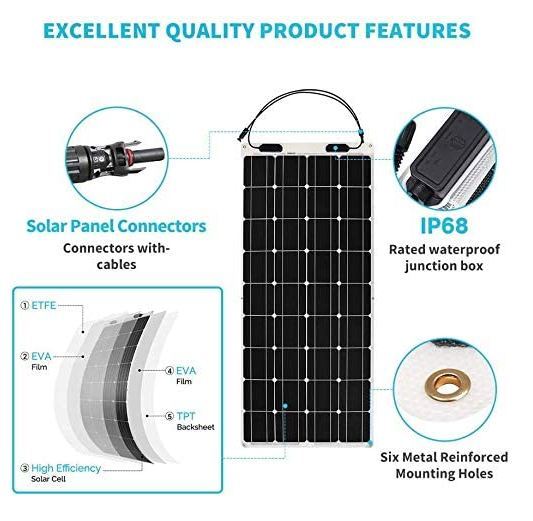
Here’s what to consider when choosing the best Renogy solar panel kit for your needs.
1. How much power do you need?
The amount of solar power you need depends on the capacity of the batteries you want to charge and the battery capacity you consume each day.
Generally, you want a solar panel kit that outputs the same amount of power as the one you draw from your battery bank daily (should be easy to monitor your battery draw with a battery monitor).
Take the Renogy 400 Watt 12V Premium Kit, for example. Assuming you get at least 4 peak sun hours daily, you can expect the solar panels to produce at least 1.6Kwh of power daily.
That’s probably enough to operate lights, a fan, charging outlets, and a toaster oven in an RV or an off-grid cabin for a day.
A 200W kit will produce one Kwh or less of power daily, making it ideal for lightweight applications like charging devices and running a fan.
For things like camping, get a solar panel kit that will fully charge your battery in a day or two. If you have a 100Ah 12V battery, a 200W kit would be adequate to recharge it in a day.
If you have an even smaller battery, a 100W Renogy kit will do.
2. Type of Solar Panels
There are two main types of solar panel technologies available for consumers: monocrystalline and polycrystalline, or just mono and poly.
Without getting into the technical details of each, all you need to know is that mono solar panels are superior.
They are more efficient (up to 21% compared to 16% efficiency in poly solar panels) and they last longer. The only downside is that they cost more.
The higher efficiency means you can get a small solar panel that produces plenty of power.
So it’s easy to set up a 200W or even 400W kit in your RV, van, or cabin since the solar panels don't take up a ton of space.
Something else to consider is whether you should get rigid or flexible solar panels. Renogy sells kits with both types.
Rigid solar panels are cheaper and work well in most situations. As long as you have a flat surface to mount the solar panels, they are easy to set up.
Flexible solar panels are more expensive because it’s more complex to make them super thin, light, and flexible without compromising efficiency and longevity.
Flexible solar panels are suitable for curved surfaces like the roof of some vans and RVs.
3. Type of Charge Controller
A charge controller regulates solar power going into your battery. It ensures your battery charges fast and safely.
Renogy solar panel kits come with one of two types of charge controllers: PWM or MPPT.
We won’t get into the weeds of how each of these works.
What’s important to know is that MPPT (maximum power point tracking) charge controllers can draw between 20% and 30% more power from solar panels compared to PWM or pulse width modulation charge controllers.
That’s because MPPT controllers can track the maximum power the solar panels put out throughout the day.
This allows them to put in the maximum amount of current possible at a particular moment into the battery.
This charges the battery faster.
In contrast, PWM don't take advantage of any extra power the solar panels produce when the sun is shining well.
Obviously, a solar panel kit with an MPPT charge controller is the best. However, it’s more expensive and doesn't always make sense especially with smaller kits.
With 50W to 200W solar panel kits, a PWM charge controller is good enough. The extra power you get from an MPPT charge controller is not that significant.
But when charging a large battery with a bigger solar panel kit, an MPPT charge controller is worth it.
4. Ease of Installation
Some of the Renogy solar panel kits are plug and play. Anyone can set it up even without much experience.
A good example is a foldable solar panel kit that has all components integrated.
Other kits require quite a bit of wiring. This is the case for roof-mounted kits. You can still install the kit yourself but you need some knowledge and experience in electrical wiring.
If you are not sure how to go about it, get a professional electrician to set it up for you.
5. Portability
If you are planning to install the solar panel kit permanently in your home, cabin, or RV, portability is not important.
You can get a bigger and heavier kit since you don't need to carry it around.
But for camping and other outdoor activities, get a compact kit that is easy to travel with. Foldable briefcase kits are the best.
Frequently Asked Questions

Are Renogy solar panels waterproof?
Renogy solar panels are waterproof. They are also designed to withstand heavy snow loads and high winds.
However, certain components like the charge controller and junction box may not be waterproof and have to be protected.
How do I set up a Renogy solar panel kit?
Check the instructions that are included with the kit. You’ll need to first mount the solar panels or set them on the ground.
If you have multiple solar panels, link them in parallel using Y branch connectors. Then connect the junction box of the solar panel to the charge controller using the included solar cable.
Finish by connecting the charge controller to your battery using the included tray cables. Most Renogy kits come with 20ft long tray cables. You can get extension cables if these are not long enough.
Make sure you observe proper polarity when making these connections.
Finish by adjusting settings on the charge controller to match the type of battery you are charging.
Is Renogy a good brand?
Renogy’s solar products generally have positive customer reviews. They sell high quality and reliable products and offer warranties of 5-25 years on their solar panels.
The only complaint many customers have is the company’s customer service. It can be hard to reach them and they are slow to respond to enquiries.
Where is Renogy based?
Renogy is a USA company based in California. However, their solar panels and other solar products are manufactured in China.


